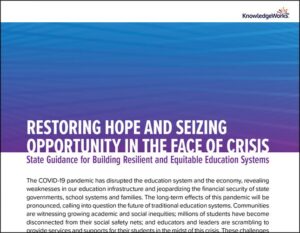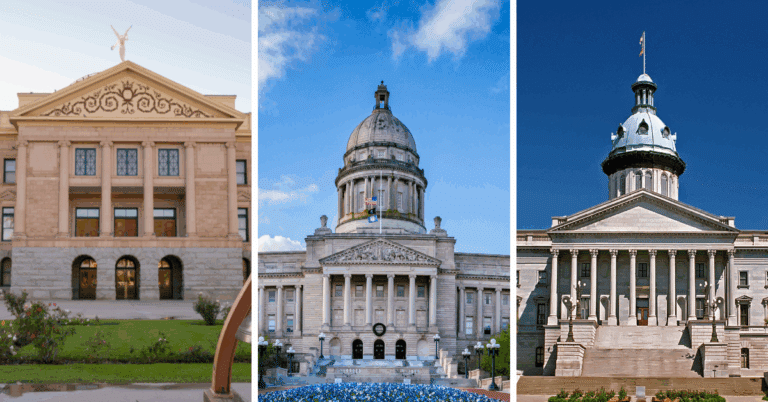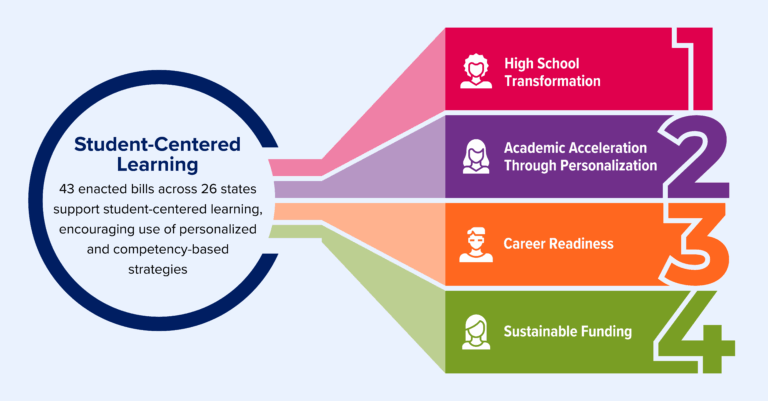This information is accurate as of early July 2023.
By Emily Brixey, senior manager of policy, advocacy and research and Sam Miller, former policy research intern at KnowledgeWorks
In our second year of legislative tracking for personalized, competency-based learning bills, KnowledgeWorks is thrilled to see an increase in the number of relevant bills being enacted across the United States. This suggests an increased interest from legislators in adopting new, innovative and personalized approaches to learning.
Follow along as we track bills supporting personalized, competency-based learning in our high interest bills tracker.
As most legislatures have wrapped up for the year, July is a prime time to review what types of policies in the personalized, competency-based learning space have passed and celebrate policies that will move education towards a student-centered approach to better support all learners. The National Conference of State Legislatures’ 2023 State Legislative Session Tracker shows that all 50 states and the District of Columbia held a session this calendar year, with 16 states and the District of Columbia actively in a session at of the time of this article. Here we highlight trends from the policy areas in our State Policy Framework for Personalized Learning that had the most legislative action this year.
Skip ahead to see the trending topics in legislation supporting personalized, competency-based learning and policy examples.
At KnowledgeWorks, we leverage our State Policy Framework for Personalized Learning to ground our policy work across states. It includes 12 policy conditions necessary for successful implementation of student-centered learning.
- Vision for student success: policies clearly articulate a vision for education that includes personalized learning to ensure every student graduates with the academic knowledge, skills and social-emotional competencies to succeed.
- Collaborative leadership: policies support the engagement of a diverse group of stakeholders across all levels of the education system to create structures for personalized learning.
- Comprehensive supports for educators and leaders: policies provide systemic efforts to build professional capacity for the implementation of high-quality personalized learning.
- Supports for historically underserved students: policies establish equitable practices aligned to culturally responsive and trauma-informed practices to intentionally address gaps in student outcomes.
- Equitable conditions for learning: policies include services provided in schools or by schools that support whole child development.
- Student learning pathways: policies empower all students to access and complete equally rigorous pathways that enable exploration of career interests.
- Quality frameworks for student success: policies support a learning framework, or set of standards, that represent the full-range of knowledge, skills and social-emotional competencies students need to success.
- Balanced assessment: policies develop or implement formative, benchmark, interim and summative assessments at the state and district level that empower educators and deepen student learning.
- Measuring success: policies support a robust performance measurement system, including accountability and reporting tools.
- Culture of innovation: policies empower educators, researchers, communities and families to design, refine, evaluate, and advance new learning models that better support student needs.
- Responsive funding systems: policies support adequate, equitable and flexible funding and resource systems that enable educators to advance personalized learning and address educational inequities.
- Continuous school improvement: policies support improvement of all schools with transparent, dynamic systems that empower local leaders and their communities to diagnose, analyze and address the needs of all students.
Number of Bills Enacted by State
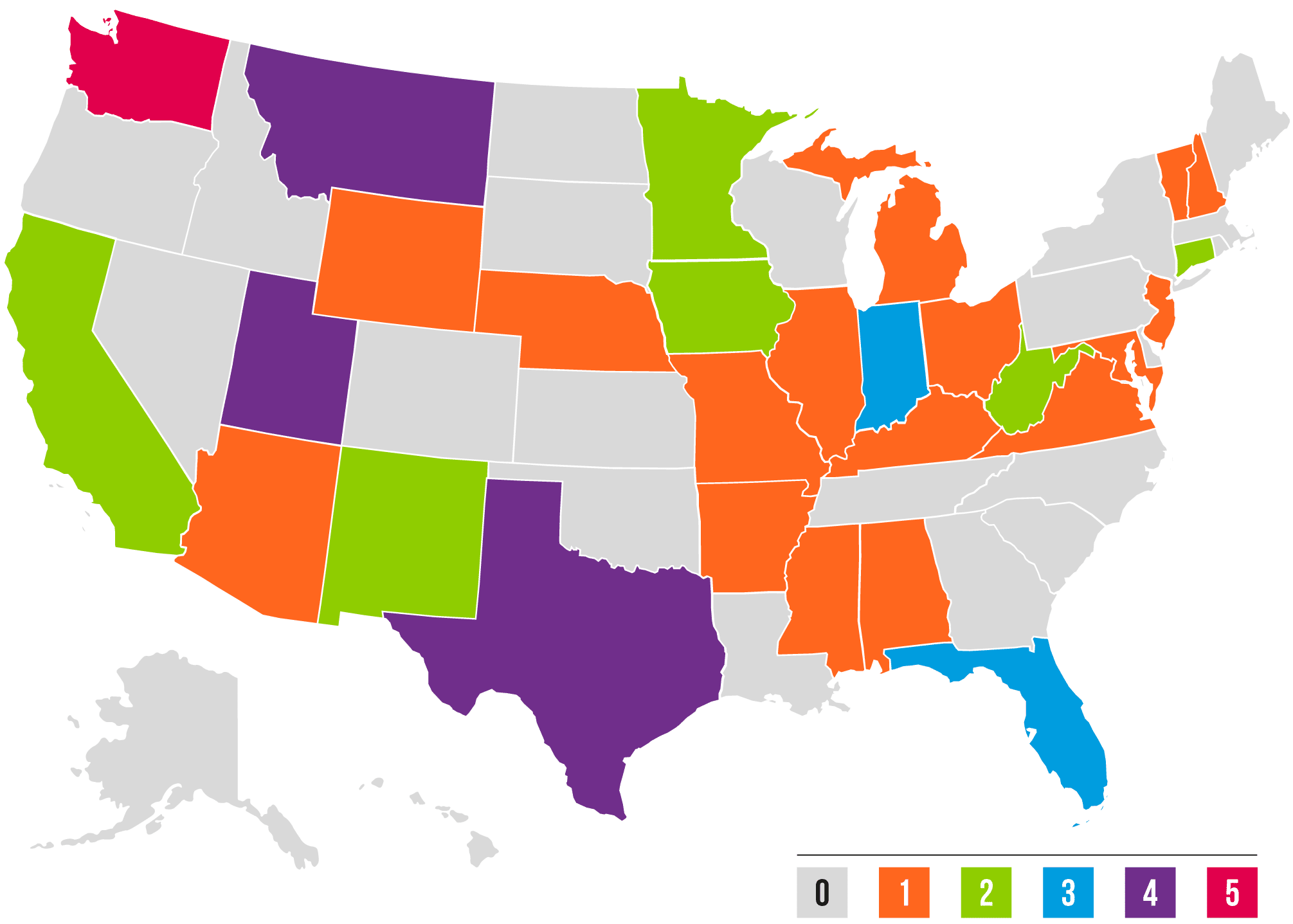
Number of Bills Introduced and Enacted
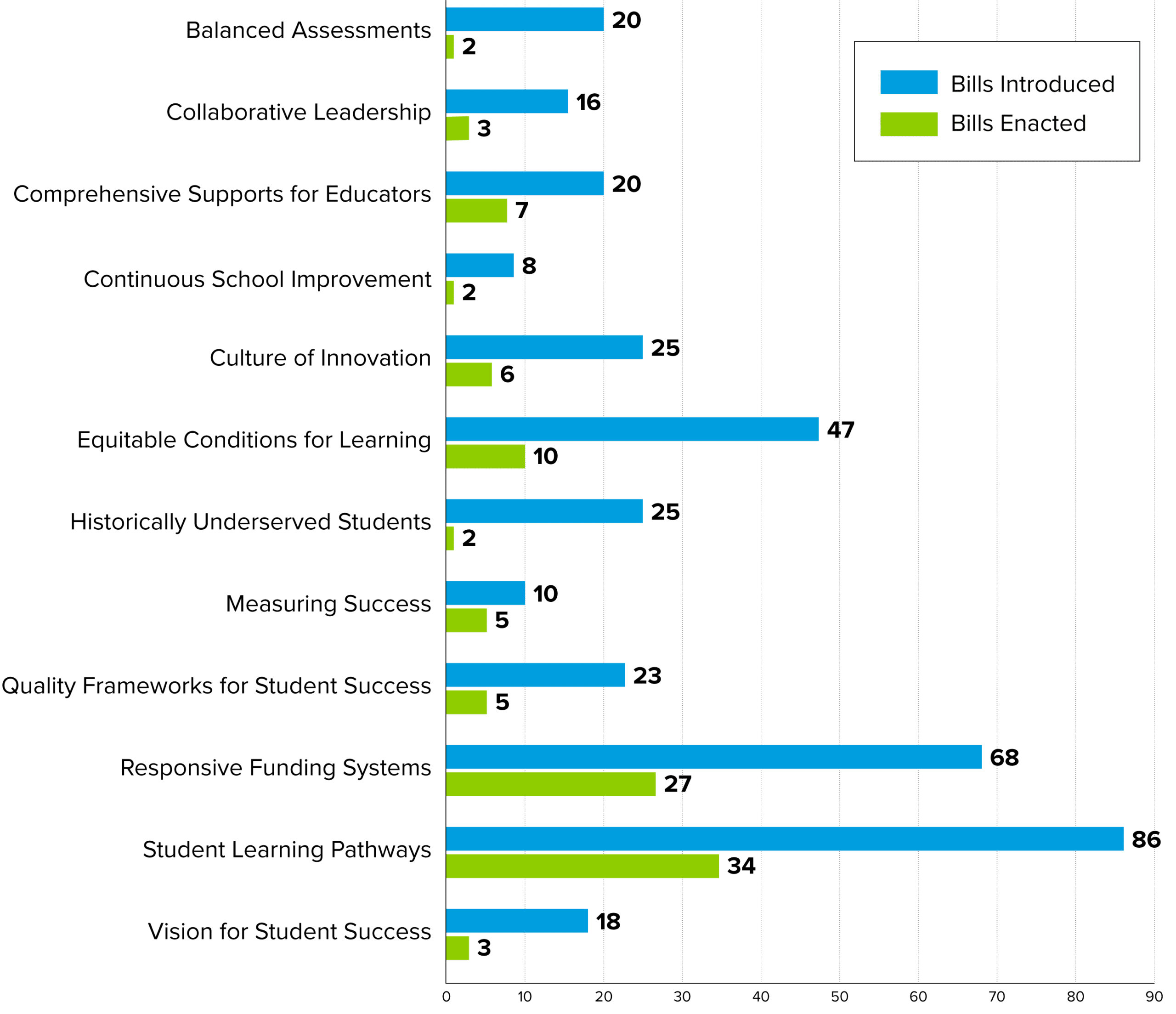
While we cast a wide net with our policy tracker, we acknowledge that we cannot possibly catch every bill related to personalized, competency-based learning. To interpret these numbers, consider them to be the minimum number of bills introduced and enacted for each policy condition. Additionally, bills can and do address multiple policy conditions – for example, if a single bill addresses both student learning pathways and responsive funding systems, it will be counted in both rows. Of the bills introduced, 52 have been enacted and will play a key role in supporting personalized, competency-based learning moving forward.
Below we dive into a more substantive analysis of trends within policy conditions and highlight interesting examples from the five policy conditions that had the greatest legislative activity this session. Each of the bills discussed below were enacted during the 2023 legislative session and will move these states towards more personalized, competency-based education practices.
Comprehensive supports for educators and leaders
Educators and school leaders are critical for the implementation of personalized, competency-based learning strategies. Often, educators and school leaders need to build their understanding of personalized, competency-based learning approaches, receive training on these practices and get the resources they need to implement them. During the 2023 session, we saw states providing these types of supports to empower educators and leaders to do this work. We identified 20 bills that were introduced and would create comprehensive supports for educators and leaders, with seven of those bills enacted.
Washington S.B. 5187 appropriates $65,610,000 from the Elementary and Secondary School Emergency Relief (ESSER) Fund for learning recovery and acceleration grants. Uses of these funds include “professional learning for educators focused on learning recovery and acceleration,” such as assessing student learning, social-emotional needs, transitioning to standards-based curricula and grading and adopting competency or mastery-based options. Implementing personalized, competency-based education practices into a classroom is best done when teachers have the space, time and financial support to do it well. Monetary supports for continued professional learning in states like Washington enable educators to seek the training they require to most efficiently and effectively serve the needs of students.
Culture of innovation
Personalized, competency-based learning often necessitates empowering learning communities with the flexibilities to design, refine, evaluate and advance new learning approaches to better support student needs and allow them to learn at their own pace. These approaches can require significant changes to traditional school structures that are articulated in policy, so state policy that allows for variation in educational delivery is often critical. This session, we saw bills that gave schools and districts increased flexibility to do things such as obtain waivers for innovative programs more easily and expand the definition of instructional hours. We identified at least six bills enacted out of 25 introduced that support a culture of innovation.
Arkansas S.B. 190 changes the process by which a public school can obtain a waiver and eliminates time limits for waivers. Previously, the State Board of Education could grant or deny, in part or in whole, a waiver petition submitted by a public school. This bill gives waivers for public schools the same criteria as are used for open-enrollment public charter schools. Additionally, public school waivers were previously limited to five years, but now the state board must show cause to revoke a waiver. Easing the process to obtain waivers and eliminating time limits will allow more school districts to take advantage of innovative waiver programs and enable successful programs to continue with greater ease.
New Mexico H.B. 130 revises the state’s definition of instructional hours. The bill adds to the existing definition by expanding what can be counted towards instructional hour requirements. This includes elements such as enrichment programs that focus on problem-solving and cognitive skills development; content that provides technical knowledge, skills and competency-based applied learning; and research- or evidence-based social, emotional or academic interventions. This broader definition of instructional hours allows for a range of activities and programs to take place during the school day so that the needs of students and educators can be more personalized. The annual requirement for instructional hours also increased from the current minimums of 990 hours for elementary school and 1,080 hours for secondary school to 1,140 for all schools. According to the bill’s legislative analysis, although this puts New Mexico’s instructional hours requirement among the highest in the country, most states do not include the items from the expanded definition and professional work in their definitions. Additionally, all schools will receive additional funding to support this increased learning time.
Equitable conditions for student learning
Students have the greatest success when they are provided with the personalized supports and flexibilities they need to succeed. This can include a variety of strategies to ensure students have access to whole child supports and access to safe and healthy environments. A first step to achieving this is to better understand students and student populations through things like studies, working groups and representation in the classroom and in positions of leadership. We saw many states prioritize this during the 2023 legislative session. We identified 47 introduced bills that would create more equitable conditions for student learning, 10 of which were ultimately enacted.
Colorado HB23-1241 establishes a task force to, at a minimum, study academic opportunities or inequities, promising practices in schools and improvements to the state’s accountability and accreditation system. The 26 members will be appointed by the governor, state legislative leaders and the state department of education. Membership will include superintendents, principals, teachers, school district board members and those who represent statewide education organizations and charter schools. The recommendations created by this task force could inform innovative and equitable school accountability policy as well as some statewide programs and teaching practices in Colorado.
Minnesota H.F. 2497 addresses teacher recruitment and retention of teachers of color and American Indian teachers in the state. To promote equitable access to racially and ethnically diverse teachers, the bill sets a goal of increasing the percentage of teachers who are of color or who are American Indian by at least two percentage points per year. This will ensure that the state’s teacher workforce more accurately reflects the diverse population of students in the state by 2040. Importantly, the bill provides funding for these efforts over the next two years including $3,500,000 in grants for mentoring, induction and retention programs for teachers of color or American Indian teachers as well as one million dollars for an “outreach and marketing campaign to elevate the profession and recruit teachers, especially teachers of color and American Indian teachers.” This bill has the potential to greatly increase the diversity of the state’s teacher population over the next two decades.
Responsive funding systems
School funding formulas, grant programs and appropriations are essential for providing high-quality state K-12 systems. These funding systems are crucial to ensuring that schools and districts have the resources necessary to support student-centered learning practices. This session, we saw many bills designed to help students with fewer financial means access potentially cost-prohibitive education opportunities. We identified 68 introduced bills that support responsive funding systems. Of these bills, 27 bills were enacted.
Texas H.B. 8 establishes the Financial Aid for Swift Transfer (FAST) program to allow eligible students to enroll for free in dual credit courses at higher education institutions. High school students who enroll in a dual credit course are eligible for the program if they met the state’s definition of educationally disadvantaged anytime in the past four years. According to the fiscal analysis, the Texas Higher Education Coordinating Board estimates that the FAST program will require $78,671,763 in the 202425 biennium. Funding for this program is appropriated in H.B. 1. Access to and participation in dual credit courses provide students with the ability to earn college credit, saving them time and money in their postsecondary journey and providing them access to personalized learning opportunities. Removing the financial barriers of dual credit courses will enable broader student participation and support more equitable access to these types of programs.
Montana H.B. 257 increases funding for a program focused on advancing students’ postsecondary success with the purpose of offsetting costs for students’ families. The Advanced Opportunity Act, as articulated in Montana law, provides advanced opportunities designed to “advance each qualifying pupil’s opportunity for postsecondary career and educational success.” This bill increases advanced opportunity funding by 50% for high school and elementary districts and more than doubles it for K-12 districts. Additionally, the bill stipulates that 75% (up from 60%) of a district’s annual advanced opportunity aid must be used to address out-of-pocket costs for qualifying students who participate in an advanced opportunity. Increasing allotments and alleviating financial burdens from families will allow more students to access important career-advancing programs, creating more equitable access to personalized learning opportunities.
Student learning pathways
Student learning pathways advance students’ college and career-readiness by allowing for increased personalization and flexibility in what, where and how they learn. These pathways also empower students to explore their career interests while helping them gain the knowledge and skills they’ll need to be successful after completing their K-12 education. This session, we saw many pieces of legislation that increase opportunities for students to engage with pathway opportunities such as career and technical education and work-based learning programs. We identified at least 34 bills enacted out of 86 introduced that support student learning pathways.
Washington H.B. 1658 allows high school students age 16 and older to earn up to two elective credits through paid work experience beginning in the 2023-2024 school year. Work-based credit proposals must be preapproved by the school counselor or principal and must include elements related to financial education. Washington’s graduation requirements allow for three of the 24 total high school credits to be personalized based on the student’s High School and Beyond Plan, completed by each student as a career planning exercise. This law creates a new avenue for students to customize their learning while gaining work experience.
Florida S.B. 240 strengthens options for students to access career and technical education and work-based learning opportunities. The Florida Department of Education is required to convene a workgroup to identify best practices in career technical education (CTE) pathways transitions and determine how to allow middle school students to continue their CTE programs into high school. This bill also allows students to earn either work-based learning credit or elective credit by participating in career and technical student organizations. In addition, each district school board is required to ensure that every high school student has access to at least one work-based learning opportunity. By increasing exposure to CTE and work-based learning, students are given a head start on their post-graduation career or continuing education plans and are able to further personalize their learning.
Hear from states on how they are prioritizing student-centered approaches in the current legislative session and from the organizations supporting them in the work.

Sam Miller, Former KnowledgeWorks Policy Research Intern
Sam supported the creation and utilization of the KnowledgeWorks policy tracking system. He graduated from the University of Wisconsin-Madison where he double majored in political science and Spanish. Sam brought valuable experience from previous internships at Literacy Network, Jubilee USA Network and Ballotpedia.

